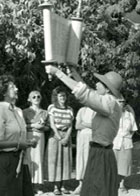Rabbah

Several weeks ago, a well-known Modern Orthodox rabbi in New York announced that a learned young woman serving in his synagogue as a teacher, preacher, pastoral counselor, and halakhic guide would henceforth be referred to as "Rabbah"—the feminine form of "Rav," or rabbi. In thus effectively ordaining Sara Hurwitz as the first female Orthodox rabbi, Avraham (Avi) Weiss set off a firestorm. The presiding body of ultra-Orthodox rabbis has ruled that Weiss himself must no longer be called Orthodox; the Rabbinical Council of America, an avowedly Modern Orthodox body, may expel him as well.
No stranger to controversy, Weiss has bucked establishments before, often in the name of his commitment to a far-reaching inclusiveness that he calls Open Orthodoxy. Several years ago, he established a rabbinical school committed to his philosophy; he is also one of the founders of the International Rabbinic Fellowship, an organization of moderate Orthodox rabbis.
Women's roles in society are debated almost everywhere, but Weiss's move issues from specifically Orthodox trends as well. One is the historically unprecedented emergence in recent decades of women versed in the sort of traditional learning formerly the precinct of men. Challenging Modern Orthodoxy from the other direction is the so-called "shift to the Right," that is, the growth in size and strength of ultra-Orthodoxy: Jews who are more stringently observant than the Modern Orthodox and far less willing to enter into dialogue, especially on matters of principle, with the outside world.
This story bears significant implications for American Jewry as a whole. Ever since the mid-19th century, Modern Orthodoxy has served as a bridge between the mass of non-Orthodox and secular American Jews and the world of tradition, complete with its passion, its scholarship, and, yes, its strangeness. If, as some suggest, the ordination of Modern Orthodox women will mark the Rubicon beyond which lies a new, "post-Orthodox" age, the bridge may give way to fresh barricades in the already fractious contests pitting Jews against fellow Jews.
Comments are closed for this article.




